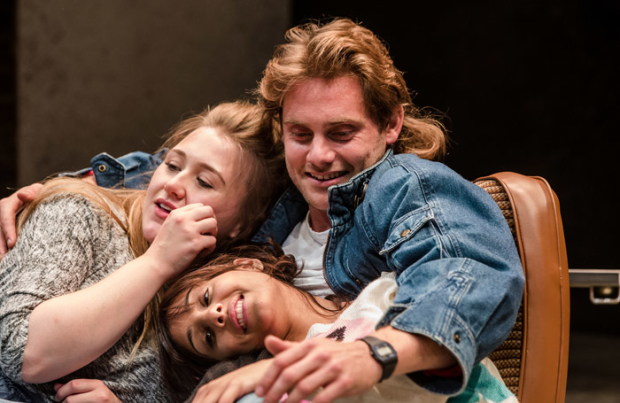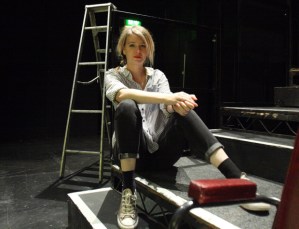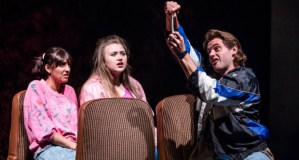Review: Rita, Sue and Bob Too (Royal Court)
Kate Wasserberg directs Andrea Dunbar’s seminal play

© Richard Davenport
"A report from the front line" is how Andrea Dunbar‘s scalding play was described when it first appeared at this theatre in 1982. She wrote it when she was just 19 which is probably why this portrait of two 15-year-old girls and their sexual relationship with the man for whom they babysit has such urgency and immediacy. She knew the girls she was writing about and she brings them vividly to life.
This particular revival, by Out of Joint Theatre, gained notoriety when the Royal Court’s artistic director Vicky Featherstone briefly banned it from her stage in the wake of the #metoo campaign and her own – admirable – decision to take the lead in stopping sexual harassment and abuse in the theatre industry.
The fact that the play opens with 27-year-old Bob’s seduction of the two underage girls, and them taking turns to have sex with him in his car was one salient factor. More problematic was the fact that the play’s original director Max Stafford Clark, who was involved in this production for three days, had left the company he founded in the wake of claims of inappropriately sexualised behaviour.
The outrage at the cancellation was immediate and justified. A working-class woman was once again being silenced by a predatory man. And Featherstone had the courage to say she was wrong. Thank goodness, because seeing this remarkable play provides accurate, bleak and pertinent context for the history of relationships between men and women. It needs to be heard now just as much as ever.
What makes it such a revelatory piece is the way that it concentrates on Rita and Sue and the shifting allegiances that form between and around them. In that still shocking first scene, they are giggly and collusive. "Do you think he believes we were a virgin?" Sue asks, as they compare notes. And you don’t quite know whether it was true or not.
What you do know is that Bob gives them a good time – his car and his relative wealth marking him out in a world where poverty, alcoholism and lack of prospects are capable of grinding a soul down. Sue and Rita are on YTS schemes in the local factory – that invention of Thatcherite Britain that provided young people with a brief taste of dead-end jobs. No wonder a romp with Bob on the moors sounds like more fun. "F*ck the world. As long as you’re alive that’s all that matters," says Sue.
It’s this buoyancy, caught in speech patterns that might have been recorded on the street, that makes Dunbar’s play so vital. It’s not sophisticated or particularly rich (there’s less background and less sentiment than in the subsequent film) but as short scene follows scene in the course of 80 minutes, she paints a picture of an entire world.
The tragedy she depicts is not that Sue’s father beats her, or that Bob, in the way of men of his time, takes sexual predation as his right, or that Bob’s wife Michelle is betrayed, but that the girls’ friendship, the bonding of the terrible two, is destroyed when Rita becomes pregnant and vanishes from the scene as Bob’s second wife.
All of this is beautifully captured in a production, directed by Kate Wasserberg, that makes a virtue of its blank functionality. In Tim Shortall’s design, four brown chairs fulfil multiple purposes, and bleak houses lour over a Bradford skyline. The action moves speedily from scene to scene, argument to argument, with the entire cast so at home in their characters that they wear them as second skins.
James Atherton is both cocky and vulnerable as Bob, a man who takes what he thinks he is owed but suffers from the expectations of a time that turns him into the bread-winner but then can’t find the work to sustain his family. As Sue, the more confident and mouthy of the girls, Gemma Dobson is all aggressive swagger, desperately trying to snatch what happiness she can; Taj Atwal’s Rita is more vulnerable and tentative. The scenes where they talk and laugh in unison are a joy.
Samantha Robinson brings equal depth to Michelle, and Sally Bankes is just terrific as Sue’s protective, ferocious mother. The scene at the close when this unlikely couple bond over their dislike of men – "all fellas do the dirty on you sometime or other" – is a wonderfully assertive rejoinder to all today’s soul-searching. This is a play, for all its rough edges, that absolutely must be seen.
Rita, Sue and Bob Too runs at the Royal Court until 27 January 2018.



















